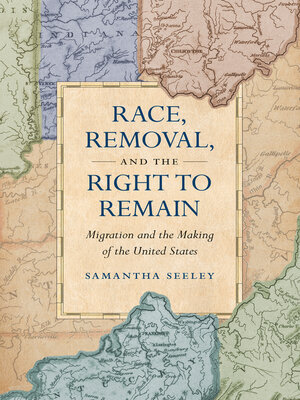Race, Removal, and the Right to Remain
ebook ∣ Migration and the Making of the United States · Omohundro Institute of Early American History and Culture and the University of North Carolina Press
By Samantha Seeley

Sign up to save your library
With an OverDrive account, you can save your favorite libraries for at-a-glance information about availability. Find out more about OverDrive accounts.
Find this title in Libby, the library reading app by OverDrive.



Search for a digital library with this title
Title found at these libraries:
| Library Name | Distance |
|---|---|
| Loading... |
Who had the right to live within the newly united states of America?
In the country’s founding decades, federal and state politicians debated which categories of people could remain and which should be subject to removal. The result was a white Republic, purposefully constructed through contentious legal, political, and diplomatic negotiation. But, as Samantha Seeley demonstrates, removal, like the right to remain, was a battle fought on multiple fronts. It encompassed tribal leaders' fierce determination to expel white settlers from Native lands and free African Americans' legal maneuvers both to remain within the states that sought to drive them out and to carve out new lives in the West. Never losing sight of the national implications of regional conflicts, Seeley brings us directly to the battlefield, to middle states poised between the edges of slavery and freedom where removal was both warmly embraced and hotly contested.
Reorienting the history of U.S. expansion around Native American and African American histories, Seeley provides a much-needed reconsideration of early nation building.
In the country’s founding decades, federal and state politicians debated which categories of people could remain and which should be subject to removal. The result was a white Republic, purposefully constructed through contentious legal, political, and diplomatic negotiation. But, as Samantha Seeley demonstrates, removal, like the right to remain, was a battle fought on multiple fronts. It encompassed tribal leaders' fierce determination to expel white settlers from Native lands and free African Americans' legal maneuvers both to remain within the states that sought to drive them out and to carve out new lives in the West. Never losing sight of the national implications of regional conflicts, Seeley brings us directly to the battlefield, to middle states poised between the edges of slavery and freedom where removal was both warmly embraced and hotly contested.
Reorienting the history of U.S. expansion around Native American and African American histories, Seeley provides a much-needed reconsideration of early nation building.







